 The history of action heroines can’t be told without a chapter on China and Hong Kong. When we watched Michelle Yeoh kick butt in Yes, Madam, did we ever think she’d be an Oscar winner? She’s just the best-known product of a system which also gave us the likes of Moon Lee, Cynthia Khan and Maggie Q. The golden era for Hong Kong Girls With Guns films, was arguably the late eighties, but it’s never died away entirely. In the past few years, I’ve been finding a rich vein of recent Chinese GWG movies on YouTube. Streaming films took off there during COVID, with makers churning out a high-volume of films, in the action, horror and SF genre. Naturally, some fall under our remit.
The history of action heroines can’t be told without a chapter on China and Hong Kong. When we watched Michelle Yeoh kick butt in Yes, Madam, did we ever think she’d be an Oscar winner? She’s just the best-known product of a system which also gave us the likes of Moon Lee, Cynthia Khan and Maggie Q. The golden era for Hong Kong Girls With Guns films, was arguably the late eighties, but it’s never died away entirely. In the past few years, I’ve been finding a rich vein of recent Chinese GWG movies on YouTube. Streaming films took off there during COVID, with makers churning out a high-volume of films, in the action, horror and SF genre. Naturally, some fall under our remit.
Though researching them has been a bit problematic. Certain… “unofficial” channels, shall we say, will post the films with titles which are largely useless in terms of finding cast, crew, or even the film’s name. For instance, I discovered this franchise via a post titled, and I quote, “【FULL MOVIE】The beautiful police officers compete with criminal gangs in a battle of wits and courag”. In the comments, someone revealed it was called Angels of Vengeance 2. I thought I’d found part one on YT… But despite having the title Angels of Vengeance, none of the synopsis or cast info matched up. It turned out to be a mis-titled copy of Angel Warriors.
This issue actually feels like a throwback to the eighties, when the In the Line of Duty series, for example, had almost different titles in every country. Similarly, you’re sometimes dealing with subtitles that are less than optimal, and as we’ll see, audio is a sadly common problem too. However, after some further research, I eventually hit the mother lode, finding all three movies with English subs on Youku’s YouTube channel. The Chinese title of the franchise is 辣警狂花, which according to Google translates as “Hot policeman crazy flower.” I guess Angels of Vengeance will do under the circumstances.
Information on the franchise, director or actresses involved is hard to come by. In fact, at the time of writing in late 2024, this would appear to be the first English-language coverage the trilogy will have ever received. I love that: discovering obscurities is, to me, one of the joys of the site, especially when they end up being generally more entertaining than many a better-known production. But to quote the lyrics to the song which close out the third installment.
The resounding song is the sword of justice
Police badges shine with firm faith
Fear no flying bullets, guns in my hands, shield on my shoulder
I’m fearless to any dangers.
We undertake missions, we maintain the faith
Proceeding with firm steps, we keep going
We’re thunderbolts, charging forward
We safeguard the peace by fighting crime.
Can’t say more than that, really. Here are reviews of each film in the series, and a YouTube playlist of the trilogy.
Angels of Vengeance: Blood Trails
★★★½
This introduces us to the main protagonist, Tang Shi-Yu (Yan), a member of a Chinese SWAT team. She is recruited to infiltrate the drug-running gang belonging to Zhao Wen-jiu (Bai), doing so by rescuing Jiu’s younger sister, Ya-Ya (Mu), who is oblivious to her sibling’s criminal activities, from an attack in a nightclub. Tang’s undercover identity is someone in debt to loan sharks, and Jiu offers to take care of this, if she comes to work for him. After proving her loyalty, and also rescuing Jiu from an assassination attempt, she’s successfully embedded in the organization. But things are complicated, due to the reason behind the hit. Jiu killed someone close to his rival, Chen Jia-hua (Zheng), and Chen is out for revenge.
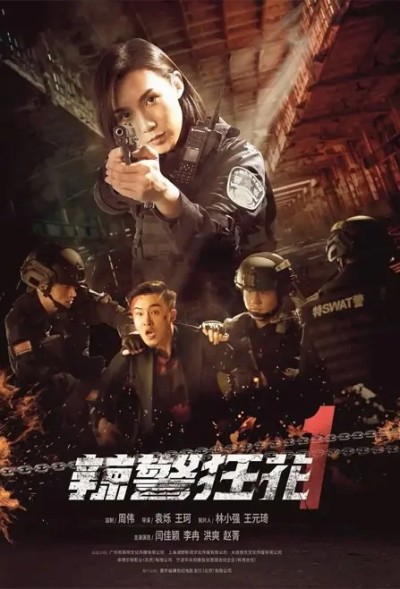 The obvious target for that is Ya-Ya, who is kidnapped, luring Jiu into a confrontation. Eventually, an uneasy peace between producer and distributoris brokered, setting the scene for a major drug deal going down at the docks. Tang informs her colleagues, and plans are put in place for a raid which will sweep up both sets of traffickers. This does a fair amount right, in particular the lead performances of Yan and Bai, which are thoughtful and well-considered. Both come over as smart individuals, and there is a complexity to the gangster which is a little surprising. Indeed, you could argue that, with his relationship to Ya-Ya, and their history, Wen-Jiu is given depth which is largely missing from Shi-yu. She is almost entirely defined by her career.
The obvious target for that is Ya-Ya, who is kidnapped, luring Jiu into a confrontation. Eventually, an uneasy peace between producer and distributoris brokered, setting the scene for a major drug deal going down at the docks. Tang informs her colleagues, and plans are put in place for a raid which will sweep up both sets of traffickers. This does a fair amount right, in particular the lead performances of Yan and Bai, which are thoughtful and well-considered. Both come over as smart individuals, and there is a complexity to the gangster which is a little surprising. Indeed, you could argue that, with his relationship to Ya-Ya, and their history, Wen-Jiu is given depth which is largely missing from Shi-yu. She is almost entirely defined by her career.
Tang does an excellent job of maintaining her undercover status, even when drenched in gasoline and threatened with immolation, and takes care of business on the action front when necessary too. I’d like to have seen more from the female members of her support team; outside of a little at the beginning, and a raid on Jiu’s offices, they don’t particularly get to show off their skills much. The ending feels a little underwhelming too, though that may partly be a result of the severely muffled audio during almost the entire sequence [It’s something you sadly need to live with on a lot of Chinese YouTube channels, even the legitimate ones like Youku]
I appreciate the practical effects: especially during the rescue attempt on Ya-Ya, there are real explosions rather than CGI. It feel like there was good effort put into the script as well, which always keeps moving forward, and Chen’s presence adds an extra twist or two. There’s a great scene when the two gangsters have a meeting in a restaurant; the intensity and tension here is off the charts, and you can sense Tang’s nervousness as she can do nothing except standby and watch. This feels like the kind of film which could easily be remade for a Western audience, and I’d be happy to watch it again. A pretty solid and promising start, delivering a better story and performances than I expected.
Dir: Yuan Shuo
Star: Jessie Yan Jia-ying, Bai Yun-Feng, Mu Lan, Zheng He-Cheng
Angels of Vengeance 2: Top Fugitive
★★★
This is based around “P2P lending” which was a major thing in China during the mid-2010’s, before the government cracked down on the various dubious pyramid schemes operating under it. A significant number of people lost a lot of money, but going by this relatively contemporary film, it’s still happening, and still problematic. In this case, young women are lured into running up large debts, and when they’re unable to pay, are abducted and sold into sex slavery, to cover the amount owed. I have some questions about exactly how this would operate, but I’m just going to presume the basic scenario makes sense in context for the local audience.
 It’s a bit more of an ensemble piece here, with Tang’s SWAT group in Hanjiang City becoming involved after being called in to resolve a hostage situation at a petrol station. Turns out, the two women were victims in the scheme, but as the investigation proceeds, the criminals involved are covering their traces in no uncertain i.e. murderous fashion. Things become rather personal, since SWAT member Hao Miaomiao (Zhao) has lent money to her cousin, Zhang Le-Le (@@@), supposed for education purposes. Turns out Lele’s boyfriend is part of the gang, but when it comes time to kidnap the victim, an administrative mix-up leads to Miaomaio being snatched off the street, rather than Le-Le.
It’s a bit more of an ensemble piece here, with Tang’s SWAT group in Hanjiang City becoming involved after being called in to resolve a hostage situation at a petrol station. Turns out, the two women were victims in the scheme, but as the investigation proceeds, the criminals involved are covering their traces in no uncertain i.e. murderous fashion. Things become rather personal, since SWAT member Hao Miaomiao (Zhao) has lent money to her cousin, Zhang Le-Le (@@@), supposed for education purposes. Turns out Lele’s boyfriend is part of the gang, but when it comes time to kidnap the victim, an administrative mix-up leads to Miaomaio being snatched off the street, rather than Le-Le.
This pushes Shi-Yu’s investigation into overdrive, because they need to find their colleague before she gets shipped permanently out of the country. After Miaomiao is able to get her hands on a phone, she contacts Shi-Yu and is able to send her location. This allows the SWAT team to tool up, and head to the rescue of their colleague. To be honest, the resulting battle represents a clear majority of the action in this installment. Up until that point, there’s a good urban chase sequence, as the team tries to stop a witness from being offed, but this is probably more of a thriller than an action movie. Although it’s still interesting, because of the cultural differences, there are points where it teeters on the edge of TVM territory.
As noted, there is a better sense of team here, and you get a feeling for the camaraderie between the various members. Witness the affectionate hazing at the end, when Miaomiao tries to skimp on the “thank you” meal for her rescuers. It’s novel to see SWAT people like Ting actively involved in a criminal investigation. This is presumably how things work in China, rather than the sharp demarcation of responsibility with detectives they have in the West. It could have use additional intensity, for example, a greater sense of threat to the victims, as it’s rather too vague on the specifics to present any real peril. The lack of a well-defined antagonist also keeps this one below the bar set by the first installment. It remains a pleasant enough way to pass 85 minutes.
Dir: Yuan Shuo
Star: Jessie Yan Jia-ying, Zhao Jing, Zhang Zi-Yue, Li Ran
Angels of Vengeance 3: Shadow Repose
★★★½
This gets off to an excellent start, depicting the kidnapping and subsequent ransom attempt of Ni-ni, the daughter of industrialist Yang Shi-ke (Bin). He’s getting instructions from the kidnapper, Li Zi-Xiong (Zhou), by phone in order to shake the tail on him, before the drop. As well as following Yang, Tang and her colleagues try to locate the victim, but neither side of this goes perfectly: while they don’t lose the ransom, there’s a trap which leaves Miaomiao badly injured in hospital, and the team with egg on their face. However, SWAT member An Qi (Zhang) suspects there’s more going on than meets the eye, with elements of Yang’s behaviour seeming suspicious.
 As seems common throughout the series, we get more time than I expected spent on the villains. In this case, one of them is killed in the first pick-up attempt, which causes his friend to want to kill Ni-Ni. When Li refuses to allow that, the friend swears vengeance against the cops he considers responsible. No prizes for guessing who that is. This adds an additional wrinkle to what might otherwise be a fairly straightforward (though effective enough) kidnapping plot. Between that and Yang’s murky actions, the story is pretty interesting. We’re kept uncertain whether what Yang is doing, is simply to get Ni-ni back safely. Especially after we learn that Li has a long track record of kidnaps – and that the victims there have not come back alive.
As seems common throughout the series, we get more time than I expected spent on the villains. In this case, one of them is killed in the first pick-up attempt, which causes his friend to want to kill Ni-Ni. When Li refuses to allow that, the friend swears vengeance against the cops he considers responsible. No prizes for guessing who that is. This adds an additional wrinkle to what might otherwise be a fairly straightforward (though effective enough) kidnapping plot. Between that and Yang’s murky actions, the story is pretty interesting. We’re kept uncertain whether what Yang is doing, is simply to get Ni-ni back safely. Especially after we learn that Li has a long track record of kidnaps – and that the victims there have not come back alive.
In effect, we have tension between Yang, who is prepared to do anything to recover his daughter, and the authorities, whose main interest seems to be in arresting the criminals, with the hostage’s health falling under the “optional” category. To what extent this reflects the reality of Chinese policy, I can’t say. It makes for an interesting point of consideration. The action has its moments too: there’s a particularly good brawl in a hotel kitchen. The finale is, at least initially, more stealth-oriented than the second part. The team capture one of the kidnappers during another attempt to collect the ransom, and successfully turn him, reminding him of the death penalty he could face – China does not mess about with punishing criminals!
He then returns to the lair, carrying the ransom, and with Tang, An and third member of the team,Yang Fan (Hong Shuang), hidden in the bag. They’re just able to free Ni-Ni before the deception is discovered, leading to an enjoysble and hard-hitting battle against Li and his henchmen (albeit with an ending which merits an “I’m so sure…” comment from this viewer!). Annoyingly, this film suffers from even worse audio problems than the first two entries, in the version provided by Youku. The sound completely vanishes at points, and when it goes, it takes the subtitles with it. The film is strong enough to survive the issue with most of the entertainment value intact. I can’t help thinking, if there had been a better presentation, this one might well have merited our Seal of Approval. Hopefully, there will be more entries to come.
Dir: Yuan Shuo, Wang Ke
Star: Jessie Yan Jia-ying, Zhou Yan, Zhang Lin, Xue Bin
 I quite liked the idea here, but the execution just wasn’t quite good enough to do justice to the concept. It feels like a matter of resources to some degree. But I also feel that a few tweaks to things would have paid significant dividends. The heroine is Tara Croydon (Fox), a CIA agent who experiences a crisis after an operation means she’s not around when her father passes away. In her depression, she signs up for a cutting-edge but rather dubious experimental project under the oversight of Hype (Medina). This involves her being given the ability to transform, physically, into one of fifteen different personas which have been implanted into her.
I quite liked the idea here, but the execution just wasn’t quite good enough to do justice to the concept. It feels like a matter of resources to some degree. But I also feel that a few tweaks to things would have paid significant dividends. The heroine is Tara Croydon (Fox), a CIA agent who experiences a crisis after an operation means she’s not around when her father passes away. In her depression, she signs up for a cutting-edge but rather dubious experimental project under the oversight of Hype (Medina). This involves her being given the ability to transform, physically, into one of fifteen different personas which have been implanted into her.




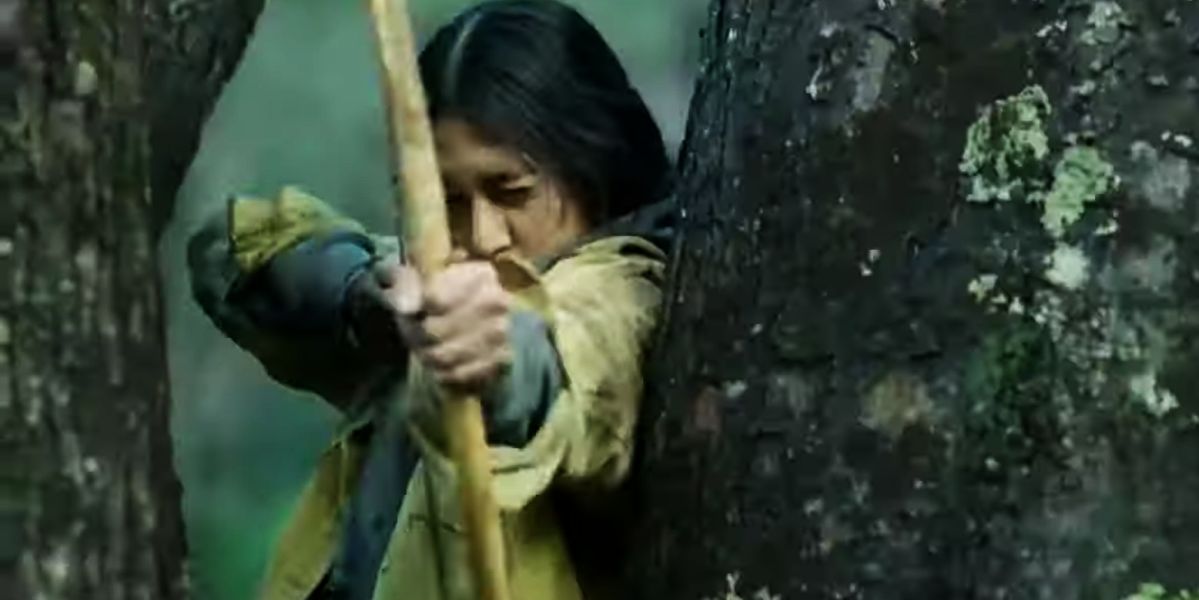 I was rather surprised to see the name of Alexander Witt pop up as the director, at the end of the first movie in this Chilean trilogy. He has been a stalwart second-unit director in Hollywood for decades, going back to Speed in 1994. With regard to the site, he fulfilled the same role on
I was rather surprised to see the name of Alexander Witt pop up as the director, at the end of the first movie in this Chilean trilogy. He has been a stalwart second-unit director in Hollywood for decades, going back to Speed in 1994. With regard to the site, he fulfilled the same role on  As a jumping-off point, this is… okay, I guess. It begins with a po-faced caption which informs the viewer this is going to be an Important Message Movie. The early going is a bit of a slog, leading to me coming to the conclusion, just because something is “traditional” doesn’t necessarily make it any good. Once granny is gunned down, the film shifts gears and gets more energy. However, I was expecting Sayen to go full Rambo, using the environment to her advantage. She doesn’t really, short of crafting a bow, which she uses one (1) time, and a bit of impromptu first-aid. Meanwhile, the bad guys could hardly be less subtle about their villainy, if they were given wax mustaches to twirl.
As a jumping-off point, this is… okay, I guess. It begins with a po-faced caption which informs the viewer this is going to be an Important Message Movie. The early going is a bit of a slog, leading to me coming to the conclusion, just because something is “traditional” doesn’t necessarily make it any good. Once granny is gunned down, the film shifts gears and gets more energy. However, I was expecting Sayen to go full Rambo, using the environment to her advantage. She doesn’t really, short of crafting a bow, which she uses one (1) time, and a bit of impromptu first-aid. Meanwhile, the bad guys could hardly be less subtle about their villainy, if they were given wax mustaches to twirl.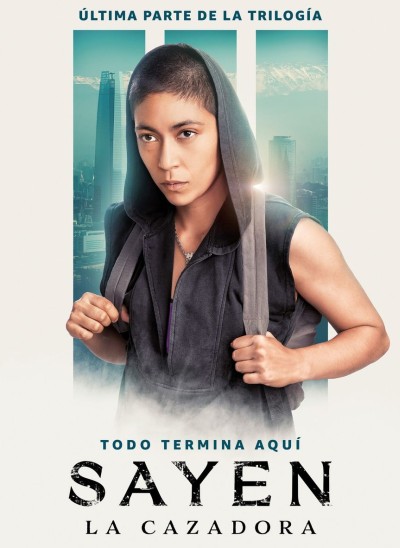 Sayen: The Huntress
Sayen: The Huntress The easiest way to describe this is a Thai version of
The easiest way to describe this is a Thai version of  The Chinese title is 狙击之王:暗杀, which Google Translate informs me translates as “Sniper King: Assassination”. I don’t want to assume anyone’s gender, but I think I’m going to go with the alternate title above, as more appropriate, over the one on the poster. Because there’s no doubt about the amazing talents possessed by Anna (Yang), for whom a shot at three kilometers range is barely an inconvenience. We get right into the action with her being committed as a psychopath after begin captured, following her assassination of a drug lord. Yet another drug lord, actually – she has a deep hatred of them, for reasons we eventually discover, and has been taking them out with regularity.
The Chinese title is 狙击之王:暗杀, which Google Translate informs me translates as “Sniper King: Assassination”. I don’t want to assume anyone’s gender, but I think I’m going to go with the alternate title above, as more appropriate, over the one on the poster. Because there’s no doubt about the amazing talents possessed by Anna (Yang), for whom a shot at three kilometers range is barely an inconvenience. We get right into the action with her being committed as a psychopath after begin captured, following her assassination of a drug lord. Yet another drug lord, actually – she has a deep hatred of them, for reasons we eventually discover, and has been taking them out with regularity. It’s not long before someone tries to kill her in the psychiatric facility, but she’s able to escape (somewhat), with the help of struck-off former doctor, Nasipan (Tao). However, she is forced, with the aid of a nano-bomb injected into her bloodstream, to take a mission for Artest (Mak). There’s a war of succession going on in the country of “Libiwala”, with the prospect of drug production becoming legal in the country – to the joy of crime boss Roger (Lee). Artest requires Anna to liquidate all those in line for the leadership to prevent this. Or maybe encourage this. It’s all a bit murky, and the plot twists and turns until the very last scene, though never gets incoherent.
It’s not long before someone tries to kill her in the psychiatric facility, but she’s able to escape (somewhat), with the help of struck-off former doctor, Nasipan (Tao). However, she is forced, with the aid of a nano-bomb injected into her bloodstream, to take a mission for Artest (Mak). There’s a war of succession going on in the country of “Libiwala”, with the prospect of drug production becoming legal in the country – to the joy of crime boss Roger (Lee). Artest requires Anna to liquidate all those in line for the leadership to prevent this. Or maybe encourage this. It’s all a bit murky, and the plot twists and turns until the very last scene, though never gets incoherent.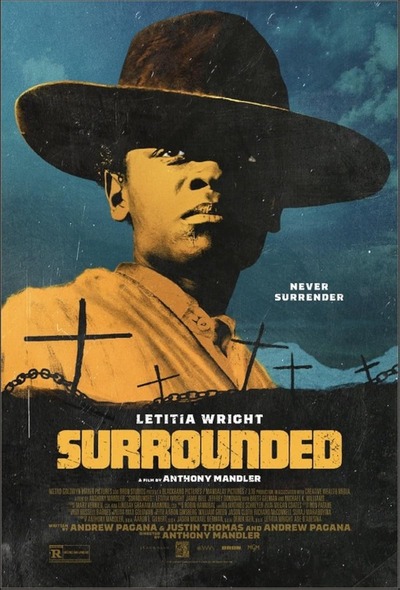 This is certainly a little different from the usual Western. It takes place a few years after the conclusion of the Civil War. Mo Washington (Wright) is on her way to Colorado to take up a piece of land she bought with her hard-earned savings. To avoid trouble on the journey, she is dressed as a man, though being black is problematic enough at that time. The stagecoach in which she’s travelling – or rather,
This is certainly a little different from the usual Western. It takes place a few years after the conclusion of the Civil War. Mo Washington (Wright) is on her way to Colorado to take up a piece of land she bought with her hard-earned savings. To avoid trouble on the journey, she is dressed as a man, though being black is problematic enough at that time. The stagecoach in which she’s travelling – or rather,  I’m very cautiously giving this one our middest of mid-tier ratings, which I reserve the right to change in future. Because this one showed up on one of the… “less official”, let’s say Chinese movie channels on YouTube. While the likes of Youku and iQiyi make the effort to deliver subtitles which are typically at least intelligible, I’d say the subs here reached such a level, only about one line in five. Then I still had to figure out cultural context for this period piece, which also seemed to reference local folklore. I guess I should be grateful the soundtrack here was intact. The previous night, I’d watched another film on the same channel which, I kid you not, had random bursts of musak injected, presumably to avoid YouTube’s automated copyright system.
I’m very cautiously giving this one our middest of mid-tier ratings, which I reserve the right to change in future. Because this one showed up on one of the… “less official”, let’s say Chinese movie channels on YouTube. While the likes of Youku and iQiyi make the effort to deliver subtitles which are typically at least intelligible, I’d say the subs here reached such a level, only about one line in five. Then I still had to figure out cultural context for this period piece, which also seemed to reference local folklore. I guess I should be grateful the soundtrack here was intact. The previous night, I’d watched another film on the same channel which, I kid you not, had random bursts of musak injected, presumably to avoid YouTube’s automated copyright system. Going off the Wikipedia article about Rose Dugdale, I can’t help feeling this could have been more epic than it was. I mean, a former debutante who, “As an IRA member, took part in the theft of paintings worth IR£8 million, a bomb attack on a Royal Ulster Constabulary station using a hijacked helicopter, and developed a rocket launcher” which used – I kid you not – packets of biscuits to absorb the recoil. There’s so much there, it feels a shame the movie focuses almost entirely on the art theft. This was carried out in 1974, raiding a stately home in rural Ireland (fun fact: the house was used as a location in
Going off the Wikipedia article about Rose Dugdale, I can’t help feeling this could have been more epic than it was. I mean, a former debutante who, “As an IRA member, took part in the theft of paintings worth IR£8 million, a bomb attack on a Royal Ulster Constabulary station using a hijacked helicopter, and developed a rocket launcher” which used – I kid you not – packets of biscuits to absorb the recoil. There’s so much there, it feels a shame the movie focuses almost entirely on the art theft. This was carried out in 1974, raiding a stately home in rural Ireland (fun fact: the house was used as a location in  The history of action heroines can’t be told without a chapter on China and Hong Kong. When we watched Michelle Yeoh kick butt in
The history of action heroines can’t be told without a chapter on China and Hong Kong. When we watched Michelle Yeoh kick butt in  The obvious target for that is Ya-Ya, who is kidnapped, luring Jiu into a confrontation. Eventually, an uneasy peace between producer and distributoris brokered, setting the scene for a major drug deal going down at the docks. Tang informs her colleagues, and plans are put in place for a raid which will sweep up both sets of traffickers. This does a fair amount right, in particular the lead performances of Yan and Bai, which are thoughtful and well-considered. Both come over as smart individuals, and there is a complexity to the gangster which is a little surprising. Indeed, you could argue that, with his relationship to Ya-Ya, and their history, Wen-Jiu is given depth which is largely missing from Shi-yu. She is almost entirely defined by her career.
The obvious target for that is Ya-Ya, who is kidnapped, luring Jiu into a confrontation. Eventually, an uneasy peace between producer and distributoris brokered, setting the scene for a major drug deal going down at the docks. Tang informs her colleagues, and plans are put in place for a raid which will sweep up both sets of traffickers. This does a fair amount right, in particular the lead performances of Yan and Bai, which are thoughtful and well-considered. Both come over as smart individuals, and there is a complexity to the gangster which is a little surprising. Indeed, you could argue that, with his relationship to Ya-Ya, and their history, Wen-Jiu is given depth which is largely missing from Shi-yu. She is almost entirely defined by her career. It’s a bit more of an ensemble piece here, with Tang’s SWAT group in Hanjiang City becoming involved after being called in to resolve a hostage situation at a petrol station. Turns out, the two women were victims in the scheme, but as the investigation proceeds, the criminals involved are covering their traces in no uncertain i.e. murderous fashion. Things become rather personal, since SWAT member
It’s a bit more of an ensemble piece here, with Tang’s SWAT group in Hanjiang City becoming involved after being called in to resolve a hostage situation at a petrol station. Turns out, the two women were victims in the scheme, but as the investigation proceeds, the criminals involved are covering their traces in no uncertain i.e. murderous fashion. Things become rather personal, since SWAT member  As seems common throughout the series, we get more time than I expected spent on the villains. In this case, one of them is killed in the first pick-up attempt, which causes his friend to want to kill Ni-Ni. When Li refuses to allow that, the friend swears vengeance against the cops he considers responsible. No prizes for guessing who that is. This adds an additional wrinkle to what might otherwise be a fairly straightforward (though effective enough) kidnapping plot. Between that and Yang’s murky actions, the story is pretty interesting. We’re kept uncertain whether what Yang is doing, is simply to get Ni-ni back safely. Especially after we learn that Li has a long track record of kidnaps – and that the victims there have not come back alive.
As seems common throughout the series, we get more time than I expected spent on the villains. In this case, one of them is killed in the first pick-up attempt, which causes his friend to want to kill Ni-Ni. When Li refuses to allow that, the friend swears vengeance against the cops he considers responsible. No prizes for guessing who that is. This adds an additional wrinkle to what might otherwise be a fairly straightforward (though effective enough) kidnapping plot. Between that and Yang’s murky actions, the story is pretty interesting. We’re kept uncertain whether what Yang is doing, is simply to get Ni-ni back safely. Especially after we learn that Li has a long track record of kidnaps – and that the victims there have not come back alive.  This is now the third film with the same title to be reviewed on the site: no
This is now the third film with the same title to be reviewed on the site: no 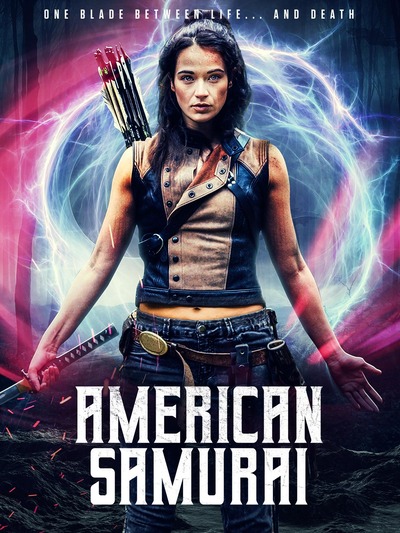 If I’d realized earlier this was by the director of the underwhelming, non-GWG film,
If I’d realized earlier this was by the director of the underwhelming, non-GWG film,